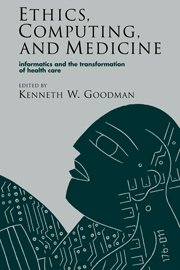Book contents
- Frontmatter
- Contents
- Preface
- List of contributors
- 1 Bioethics and health informatics: an introduction
- 2 Medical informatics and human values
- 3 Responsibility for computer-based decisions in health care
- 4 Evaluating medical information systems: social contexts and ethical challenges
- 5 Health care information: access, confidentiality, and good practice
- 6 Ethical challenges in the use of decision-support software in clinical practice
- 7 Outcomes, futility, and health policy research
- 8 Meta-analysis: conceptual, ethical, and policy issues
- Index
4 - Evaluating medical information systems: social contexts and ethical challenges
Published online by Cambridge University Press: 12 November 2009
- Frontmatter
- Contents
- Preface
- List of contributors
- 1 Bioethics and health informatics: an introduction
- 2 Medical informatics and human values
- 3 Responsibility for computer-based decisions in health care
- 4 Evaluating medical information systems: social contexts and ethical challenges
- 5 Health care information: access, confidentiality, and good practice
- 6 Ethical challenges in the use of decision-support software in clinical practice
- 7 Outcomes, futility, and health policy research
- 8 Meta-analysis: conceptual, ethical, and policy issues
- Index
Summary
Despite more than 30 years of development of computer-based medical information systems, the medical record remains largely paper-based. A major impediment to the implementation and use of these systems continues to be the lack of evaluation criteria and evaluation efforts. It is becoming apparent that the successful implementation and use of computer-based medical information systems depends on more than the transmission of technical details and the availability of systems. In fact, these systems have been characterized as radical innovations that challenge the internal stability of health care organizations. They have consequences that raise important social and ethical issues. This chapter provides a thorough historical and sociological context and analyzes how computer-based medical information systems affect (1) professional roles and practice patterns, (2) professional relations between individuals and groups, and (3) patients and patient care. In a point that is crucial for the development of health information systems, the authors argue that, aside from quality control, risk management, or fiscal efficiency, there is an ethical imperative for conducting system evaluations. This means that no commitment to computational advancement or sophistication is sufficient unless it includes a well-wrought mechanism for evaluating health computing systems in the contexts of their use. Failure to perform such evaluations becomes a shortcoming that is itself ethically blameworthy.
Introduction and history
Medical computing is not merely about medicine or computing. It is about the introduction of new tools into environments with established social norms and practices.
- Type
- Chapter
- Information
- Ethics, Computing, and MedicineInformatics and the Transformation of Health Care, pp. 57 - 74Publisher: Cambridge University PressPrint publication year: 1997



